Lewis Capaldi’s first album went multiplatinum and led to chart-topping hits, sold-out stadiums, and a Grammy nomination for the singer-songwriter. Besting that with his sophomore album was daunting enough, but then he agreed to allow a Netflix documentary crew to follow him. Capaldi says, with his trademark wit, he wouldn’t recommend it to anyone.
The result is “How I’m Feeling Now,” a film that reveals the fear and anxiety that plagued the recording artist as he returned home to Scotland and tried to write new songs during the pandemic. Capaldi — who has more than 6 million Instagram followers — is known for funny, self-deprecating posts, so the film’s depiction of his mental health struggles, complicated by a recent diagnosis of Tourette syndrome, may be a surprise to his fans.
In a recent interview with The Associated Press, Capaldi describes the release of the film — which drops Wednesday — as a necessary “catharsis,” and discusses lessons learned and staying in his lane. Answers have been edited for clarity and brevity.
AP: How does it feel, releasing the film and making yourself so vulnerable?
CAPALDI: It’s a bit strange, to be honest. I didn’t really even know that this film was going to be like this. When we started making it, it was going to be me being on tour in 2020 and playing all these festivals and sort of this triumphant thing and actually became quite a vulnerable thing. I feel quite naked. And can I tell you something? I don’t look very good naked! (laughs)
So it’s a bit of a weird one. But yeah, I’m excited for people to see it and I’m really proud of it. The stuff that I’ve addressed since seeing the film, it’s just been a really cathartic experience all round and catharsis isn’t always easy or painless.
AP: What did you learn about yourself in the process of making the film?
CAPALDI: It’s a lot more tragic than I was expecting! I see what I see when I’m speaking to my parents or my friends or whatever. But I don’t see how it affects them when I’m not around. I was like, ‘I really need to get myself in order,’ because it’s not fair on other people for me to continue to sort of neglect my own mental health.
It was such a surreal experience watching it all back and it was a lot more depressing than I was expecting. I was surprised that I never died at the end. (laughs) I was like, wow, this is pretty real. But it’s cool. I’m very grateful for the opportunity to make it.
AP: You had writer’s block working on the second album — was that even harder with a film crew following you? Did you regret it?
CAPALDI: Oh, every single moment of making the documentary, I thought, ‘Why did I agree to do this?!’ Even on days they would just come round my house and found me puttering around for like b-roll footage. I was like, This is so f---ing annoying.
The only way I can describe how I feel … the only way I’ve described fame in general is “embarrassing.” If I was driving around my hometown or I was going to the pub and the cameras came ... If someone else was doing it, I would be like, ‘Who does this guy think he is bringing a camera around here? Like he thinks people want to watch a film about his life!’ And I’m like, ‘No, I don’t, honestly!’
I lead quite an ordinary life, which I think you can kind of see. I think the amazing thing is what (director Joe Pearlman) managed to pull together, that story of my mental health and the imposter syndrome.
AP: In the doc you get a diagnosis of Tourette syndrome. How are you managing that?
CAPALDI: I’m glad to have a diagnosis, because I thought I was dying, which is a big thing for me. I try not to learn too much about my Tourette's because then I find that it gets worse. The more I read about it, the worse it gets. Some days it’s fine and some days it’s a lot worse than others. But I just kind of have to get on with it, unfortunately. That’s just how my life is.
AP: You personally and regularly respond to hundreds of fans on social media. Why is that important to you?
CAPALDI: A lot of people don’t realize a lot of this job is sitting around waiting to do something, whether it’s a gig, or waiting to do an interview. So it’s not actually as cumbersome as people might think. People taking the time to comment … It’s nice to take the time to comment back, I guess. It’s just something we’ve done since when we first started posting stuff and it was four comments on a post. And I know that it can be anywhere from four to 40,000. It’s nice to have a little back-and-forth with people who are keen on the music and keen on things that I do.
AP: Your social feeds are so funny — have people approached you about acting?
CAPALDI: I don’t think I’d be able to do acting. We shot a music video recently for a song that I brought out called ‘Pointless’ that never actually made it out because I have a real problem looking at people’s faces and it just feels so odd to me. It looked so stiff and weird. There was an agent once who asked me about films, but I won’t be doing a Harry Styles anytime soon and conquering the world of acting.
I think for now I’m staying firmly in my lane. Unless the music work dries up, in which case I’ll take the cash from anywhere.
Brooke Lefferts, The Associated Press



